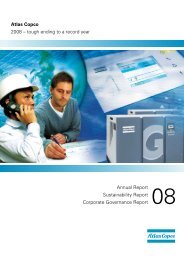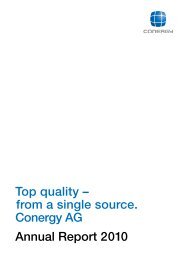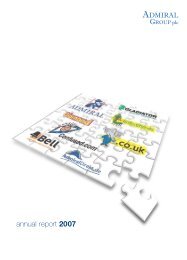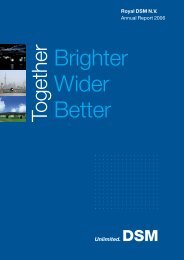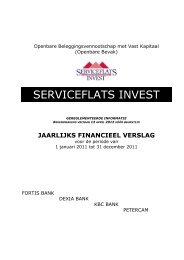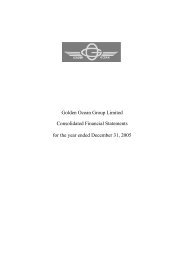Punch Taverns plc 2007 Annual Report and Financial Statements
Punch Taverns plc 2007 Annual Report and Financial Statements
Punch Taverns plc 2007 Annual Report and Financial Statements
You also want an ePaper? Increase the reach of your titles
YUMPU automatically turns print PDFs into web optimized ePapers that Google loves.
<strong>Punch</strong> <strong>Taverns</strong> <strong>plc</strong> <strong>Annual</strong> <strong>Report</strong> <strong>and</strong> <strong>Financial</strong> <strong>Statements</strong> <strong>2007</strong> 573<br />
1 Accounting policies continued<br />
Derivatives that do not qualify for hedge accounting<br />
Changes in fair value of any derivative financial instruments that do not qualify for hedge accounting are recognised immediately in<br />
the income statement.<br />
<strong>Financial</strong> guarantee contracts<br />
<strong>Financial</strong> guarantee contracts are initially recognised at fair value. Subsequent movements in fair values are recognised in the income statement.<br />
Share-based payment transactions<br />
A number of employees of the Group (including Directors) receive an element of remuneration in the form of share-based payment<br />
transactions, whereby employees render services in exchange for shares or rights over shares (‘equity-settled transactions’).<br />
Equity-settled transactions are measured at fair value at the date of grant. The fair value of transactions involving the granting of<br />
shares is determined by the share price at the date of grant. The fair value of transactions involving the granting of share options<br />
is calculated by an external valuer based on a binomial model, a beta model or the Black-Scholes model dependent upon the most<br />
appropriate valuation model for the individual scheme. In valuing equity-settled transactions, no account is taken of any performance<br />
conditions, other than conditions linked to the price of the shares of <strong>Punch</strong> <strong>Taverns</strong> <strong>plc</strong> (‘market conditions’).<br />
The cost of equity-settled transactions is recognised, together with a corresponding increase in equity, on a straight-line basis over<br />
the vesting period based on the Group’s estimate of how many of the awards will eventually vest. No expense is recognised for awards<br />
that do not ultimately vest, except for awards where vesting is conditional upon a market condition, which are treated as vesting<br />
irrespective of whether or not the market condition is satisfied, provided that all other performance conditions are satisfied.<br />
Where the terms of an equity-settled award are modified, as a minimum, an expense is recognised as if the terms had not been<br />
modified. In addition, an expense is recognised for any increase in the value of the transaction as a result of the modification, as<br />
measured at the date of the modification.<br />
Where an equity-settled award is cancelled, it is treated as if it had vested on the date of cancellation <strong>and</strong> any expense not yet<br />
recognised for the award is recognised immediately. However, if a new award is substituted for the cancelled award, <strong>and</strong> designated<br />
as a replacement award on the date that it is granted, the cancelled <strong>and</strong> new awards are treated as if they were a modification to<br />
the original award, as described in the previous paragraph. The dilutive effect of outst<strong>and</strong>ing options is reflected as additional share<br />
dilution in the computation of earnings per share.<br />
The Group has taken advantage of the transitional provisions of IFRS 2 in respect of equity-settled awards <strong>and</strong> has applied IFRS 2<br />
only to equity-settled awards granted after 7 November 2002 that had not vested before 1 January 2005.<br />
Revenue<br />
Revenue is measured at the fair value of the consideration received or receivable <strong>and</strong> represents amounts receivable for goods <strong>and</strong><br />
services provided in the normal course of business, net of discounts <strong>and</strong> VAT. All operations take place solely in the United Kingdom.<br />
Drink <strong>and</strong> food sales<br />
Revenue in respect of drink <strong>and</strong> food sales is recognised at the point at which the goods are provided, net of any discounts or volume<br />
rebates allowed.<br />
Rents receivable<br />
Rents receivable are recognised on a straight-line basis over the lease term.<br />
Machine income<br />
The Group’s share of net machine income is recognised in the period to which it relates.<br />
Trade <strong>and</strong> other receivables<br />
Trade receivables are recognised <strong>and</strong> carried at original invoice amount less an allowance for any uncollectible amount. An estimate<br />
for doubtful debts is made when collection of the full amount is no longer probable. Bad debts are written off when identified.<br />
Cash <strong>and</strong> cash equivalents<br />
Cash <strong>and</strong> cash equivalents in the balance sheet comprise cash at bank <strong>and</strong> in h<strong>and</strong> <strong>and</strong> short term deposits with an original maturity<br />
of 3 months or less.<br />
Cash deposits held as security for the benefit of note holders are not classified as cash <strong>and</strong> cash equivalents.<br />
Inventories<br />
Inventories are valued at the lower of cost (calculated on a first in – first out basis) <strong>and</strong> net realisable value.<br />
Non-current assets held for sale<br />
Non-current assets classified as held for sale are measured at the lower of carrying amount <strong>and</strong> fair value less costs to sell <strong>and</strong> are<br />
not depreciated.<br />
Non-current assets <strong>and</strong> disposal groups are classified as held for sale if their carrying amount will be recovered through a sale transaction<br />
rather than through continuing use. This condition is regarded as met only when the sale is highly probable <strong>and</strong> the asset is available<br />
for immediate sale in its present condition. Management must be committed to the sale <strong>and</strong> completion should be expected within<br />
one year from the date of classification.<br />
Dividend distribution<br />
Final dividends are recognised as a liability in the Group’s financial statements in the period in which the dividends are approved<br />
by the Company’s shareholders. Interim dividends are recognised when they are paid.<br />
Exceptional items<br />
In order to provide a trend measure of underlying performance, profit is presented excluding items which management consider<br />
will distort comparability, either due to their significant non-recurring nature or as a result of specific accounting treatments.




